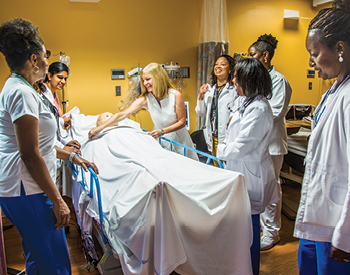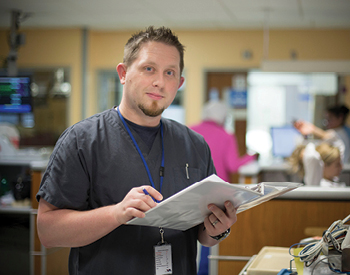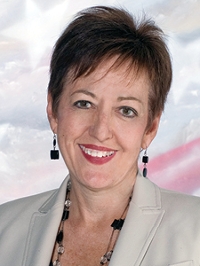A different battlefield
By Pam Auchmutey

VA nurses from various community clinics practice health assessment in a refresher course taught by Emory nursing faculty at the Atlanta VA Medical Center. Photography by Bryan Meltz
In the 2009 movie The Hurt Locker, Staff Sergeant William James leads a bomb disposal unit in Baghdad, where he faces the prospect of sudden injury and death in ways that are harrowing and cruel. It becomes a normal way of life for James, who can't adjust to the rhythms of family life when he returns home. Domestic life proves so mundane that he signs on for another tour of duty in Iraq.
The VAMC ConnectionThe School of Nursing and the Atlanta VAMC partner on several initiatives in addition to the VANAP programs for BSN and MSN students. • The National VA Quality Scholars Advanced Fellowhips train nurses and physicians to develop innovative approaches to enhancing health care services for veterans. • Dedicated education units, or DEUs, provide one-on-one clinical training for BSN students in psychiatry/mental health and geriatrics at the VAMC. • This past summer, six juniors completed clinical internships at the the VAMC sponsored by the VALOR (VA Learning Opportunities Residency) Program. All of the students are in the VANAP program for BSN students. |
While James's situation is meant to be dramatic, it's a stark reminder of the difficulties that men and women face after serving in a war zone. It's estimated that 20 percent of veterans returning from Afghanistan and Iraq experience post-traumatic stress disorder (PTSD), one of many problems they often face.
"We owe veterans a lot," says Lisa Muirhead DNP RN APRN-BC ANP, clinical assistant professor in the School of Nursing. "They leave their families behind when they are deployed. They subject themselves to explosive devices and wearing heavy gear in the field. They come back home as changed individuals, and the adjustment can be huge. It's a different battlefield."
That notion is being infused more deeply into the nursing curriculum via two programs led by Emory nursing faculty and Atlanta VA Medical Center (VAMC) nurses. The programs provide specialty education in veteran care for BSN and MSN students, respectively, and create new faculty positions held by VAMC nurses who train academically at the School of Nursing. They are funded with separate awards totaling nearly $10 million from the U.S. Department of Veterans Affairs (VA). Both programs aim to strengthen health services for veterans and the pipeline of qualified nurses who care for them.
May 2015 marked a milestone in the life of each program. First, the VA selected Emory and five other U.S. nursing schools for the VA Nursing Academic Partnership for Graduate Education (VANAP-GE) to train advanced practice nurses to care for aging veterans. Through VANAP-GE, Emory will add five faculty positions, to be held by VAMC nurses, and grow its adult/gerontology nurse practitioner program by 32 students over five years. The first six students began the program this fall.
|
|
Also last May, the first students in the VANAP program for undergraduates received their BSN degrees after two years of courses at Emory and clinical rotations at the VAMC. All trained in various aspects of veteran care, including mental health, traumatic brain injury (TBI), home-based health, women's health, and homeless care. Now in its third year, VANAP is funding 10 new faculty positions and adding 100 BSN students over five years. It also includes a clinical innovation component to provide refresher courses and simulation training for VAMC nurses, all taught by Emory faculty.
The need for qualified nurses is top of mind for VA leaders. "We are one of the largest and fastest growing medical centers in the nation," said Atlanta VAMC director Leslie Wiggins during a recognition ceremony for VANAP students a few days before graduation. "We've gone from serving 96,000 to 100,000 veterans in the past 12 months."
"This first cohort of students is very special, and it's going to put us on the map in a way we've wanted to be for a long time," Wiggins continued. "You leave a legacy for those who come behind us to continue our work."
Training for VANAP scholars doesn't necessarily end when they graduate. Of the 21 BSN graduates, 16 plan to work at the Atlanta VAMC after completing one year of residency (working on different units) or one year of transition to practice (working on a specific unit). Students are not obligated to work for the VAMC. One new graduate was accepted into a PhD program, while others plan to work at other hospitals.
That's okay with Muirhead, the VANAP coordinator at Emory. "Seventy-five percent of veterans receive health care outside of the VA," she says. "Whether graduates work within the VA or branch out into the community, they will understand the needs of veterans and their families."
Phyllis Wright DNP APRN-BC, Muirhead's counterpart in the VANAP-GE program, oversees the training of nurse practitioners to address the shortage of primary care nurses in the VA health system. The shortage is expected to intensify as more and more nurses retire and the number of aging veterans who need primary care grows.
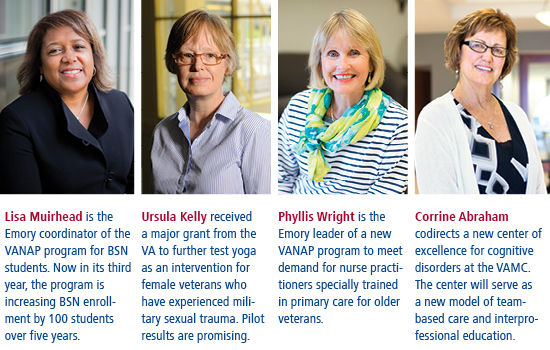
Over the course of four semesters, VANAP-GE students will receive a stipend for clinical practice hours, which include advanced training in primary care, women's wellness, mental health, geriatrics, home-based primary care, palliative care, and HIV/AIDS care. When they graduate, students will be eligible to sit for the national certification exam in adult health/gerontology primary care nursing. The grant also calls for developing a paid residency program open to all NPs in adult/gerontology primary care. The first cohort will begin in March 2016.
"We have great buy-in from [VAMC chief nursing officer] Sandy Leake," says Wright. "She sees the advantage of training six more nurse practitioners and six more residents a year. When they get up to full speed, each NP can see an average of 15 patients per day. That adds up to a lot of patients per month and per year."
VANAP-GE also provides startup funds for an Emory faculty practice at the VAMC. One option on the table is expanding the intake clinic for newly returned veterans. "That process is so backlogged that it often takes many days to be seen the first time," says Wright. "An Emory faculty practice could stay open after hours or on Saturdays to increase access for veterans. Our goal is to develop a sustainable practice long after this grant expires."
Those faculty members would augment the slightly more than 1,000 nurses who staff the Atlanta VAMC main campus and its 14 clinics
in north Georgia.
A rich partnership
Emory's relationship with the Atlanta VAMC dates back some 70 years. The VAMC has provided clinical placements for BSN and MSN students for many of those years. This alliance gained traction when Emory nursing dean Linda McCauley and VAMC chief nursing officer Sandy Leake MSN RN deepened their partnership. A key step was recruiting Ursula Kelly PhD ANP-BC PMHNP-BC as a VAMC nurse scientist and assistant professor of nursing in 2009. The VAMC half of Kelly's position helps fill a need identified during the VAMC's successful Magnet designation process to develop a program of nursing research and incorporate evidence-based practice into nursing services.
Since arriving, Kelly has developed a significant body of research on PTSD and on military sexual trauma (MST) among female veterans. This year, she received $1.1 million from the VA to further test an intervention for women who have experienced MST, which often leads to PTSD and other mental health issues. Her four-year study will compare the benefits of trauma-sensitive yoga and cognitive processing therapy. It also will examine the effects of yoga on chronic pain, insomnia, and inflammatory and acoustic startle responses related to PTSD. Approximately 210 female veterans are expected to enroll.
|
|
It's not unusual for these veterans to delay treatment for MST and/or PTSD for years. "There is no age restriction and no physical limitation for women veterans in this study," Kelly says.
She also has a clinical component in her work at the VAMC, where she sees veterans in the outpatient PTSD clinic. Within the clinic is a dedicated MST treatment team—a standout for the VA nationally, notes Kelly, a certified adult and psych/mental health nurse practitioner.
"The VA has always been a leader in PTSD treatment and research," she says. "But in the past decade, the number of veterans, male and female, has grown substantially because of the conflicts in Iraq and Afghanistan. And because health care has improved so much in the field, soldiers are surviving more than they used to with more complicated and devastating physical problems such as TBI."
As Kelly's work at the VAMC has expanded, so has demand for expertise in evidence-based practice. That need has been filled by clinical assistant professor Corrine Abraham DNP 85MN RN, who serves half time as coordinator of evidence-based practice and innovation at the VAMC. She wrote her own job description after completing a National VA Quality Scholars Advanced Fellowship there. As a result, she is working with VA nursing executives to strengthen capacity in leadership, education, evidence-based practice, and quality improvement.
Abraham also codirects the new VAMC Specialty Care Education Center of Excellence for Cognitive Disorders, supported by a $1.5 million three-year VA grant. She and Emory physician Anne Tomolo MD MPH envision the center as a new model of care for veterans and a new way of teaching interprofessional students.
"The center will help bridge the gap for patients by integrating telehealth and shared appointments with team members specializing in psychiatry, gerontology, palliative care, and social work," says Abraham. "Students will learn about specialty care for cognitive disorders with an emphasis on teamwork, collaboration, and quality improvement."
Abraham and Kelly fully expect to intersect more with students in both VANAP programs, before and after they earn their degrees. "Students who come to the VA, especially graduate students, traditionally have episodic experiences," says Abraham. "The residency program for VANAP graduates not only furthers their education but also makes them more effective as new nurses since they are more familiar with veteran-centric care."
Leake, the VAMC's chief nursing officer, welcomes the infusion of VANAP students for that reason and more.
"The VA headquarters in D.C. is committed to ensuring there is a steady pipeline of nurses graduating from high-quality nursing schools who are prepared to care for veterans," she says. "But recruiting qualified nurses into the VA system is not necessarily the ultimate goal. The VA feels a broader responsibility to prepare nurses who are sensitive to veterans' unique needs, including nurses who work outside the VA system. The larger goal is to ensure that veterans everywhere receive the very best care."
VA mission hooked nursing leaders early on
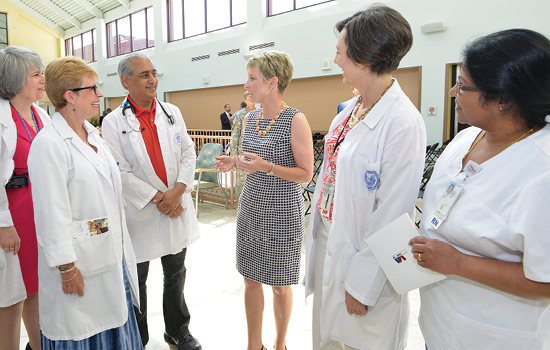 Sandy Leake (center) confers with staff at a new outpatient clinic for veterans in Atlanta. Photography by Ann Hamilton/Atlanta VAMC
Sandy Leake (center) confers with staff at a new outpatient clinic for veterans in Atlanta. Photography by Ann Hamilton/Atlanta VAMC
Working at the VA gets in your blood, note Sandy Leake MN RN and Michelle Cox-Henley 84MN RN. Both began their VA careers in Gainesville, Florida, and now serve as top-level VA nursing leaders in Georgia.
|
|
"The mission of the VA hooked me early on," says Leake, who has served as CNO of the Atlanta VA Medical Center (VAMC) for 20 years. "I was immediately struck by this incredible sense of satisfaction in working for and on behalf of veterans. The mission of the VA hooked me 25 years ago, and I find that happens a lot."
Cox-Henley worked in the private sector and earned her MSN in critical care nursing at Emory before joining the Malcolm Randall VAMC in Gainesville, where she advanced to chief nurse of surgery and collaborated with other VA facilities. She also hired Leake, who had just completed her graduate degree on a VA scholarship at Vanderbilt University. Cox-Henley later was recruited to the Charlie Norwood VAMC in Augusta, Georgia, where she has served as CNO for four years.
After arriving in Augusta, Cox-Henley faced a large nurse vacancy rate and difficulty in recruiting nurses. She worked with the medical center director to increase salaries to attract competent nurses to work at the bedside and in nursing administration.
More recently, she implemented a shared decision-making model at the unit level for nursing staff in collaboration with physicians, laboratory services, physical therapy, and other disciplines. Nurses also have embraced a new 72/80 work schedule (72 hours of work, 80 hours of pay) under her leadership.
The nursing shortage remains a challenge and, like its Atlanta VAMC cousin, the Augusta facility offers a residency program to attract and retain new nurses skilled in veteran care. It also strives to serve a growing number of unique patients—currently 46,000—from Georgia and nearby South Carolina.
"Any change that we make takes a lot of momentum and more time than in the private sector," says Cox-Henley. "It's like moving a large ship. The challenge for the VA is to remain focused on the patient while the bureaucratic noise goes on around you."
In challenging moments, she recalls the advice given her when first recruited to the VA. "It all comes back to, 'What does the patient need?' That takes away the personal agenda and leads people back to a cooperative spirit and the central service we provide, which is patient care."—Pam Auchmutey

